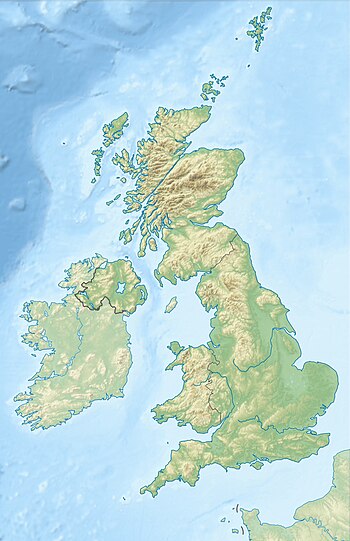James Berry (major-general)
James Berry | |
|---|---|
 Scarborough Castle,where Berry was imprisoned from 1660 until his release in 1672 | |
| Member of Parliament forWorcestershire | |
| In office September 1656 – February 1658 | |
| Rule of the Major-Generals,responsible forHerefordshire,Worcestershire,ShropshireandWales | |
| In office November 1655 – January 1657 | |
| Personal details | |
| Born | Unknown Uncertain |
| Died | 9 May 1691 Stoke Newington |
| Nationality | English |
| Spouse | Mary Berry (died 1681) |
| Military service | |
| Rank | Major General |
| Battles/wars | |
James Berry,died 9 May 1691, was aClerkfrom theWest Midlandswho served with theParliamentarianarmy in theWars of the Three Kingdoms.Characterised by a contemporary and friend as "one of Cromwell's favourites",[1]during the 1655 to 1657Rule of the Major-Generals,he was administrator forHerefordshire,Worcestershire,ShropshireandWales.
In this role, Berry's sympathetic treatment ofFifth MonarchistsandQuakers,two religioussectsmany viewed as anarchic revolutionaries, meant he was seen as unreliable byGeorge Monck,architect of the 1660Stuart Restoration.Arrested in early 1660, he was held inScarborough Castleuntil 1672; after his release, he became aMarket gardenerinStoke Newington,where he died in 1691.
Personal details
[edit]Almost nothing is known of Berry's early life, other than by the 1630s he was employed as aclerkat anIronworksin theWest Midlands.[2]He shared a house inStourbridgewithRichard Baxter(1615–1691), aPresbyterianministerwhom he helped win an appointment as schoolmaster inDudley,and attended hisordinationin 1638.[3]
At some point before 1650, he married Mary Berry, who died in 1681; whether they had children is unknown.
First English Civil War
[edit]When theFirst English Civil Warbegan in August 1642, Berry becameCaptain lieutenantin the cavalry regiment commanded byOliver Cromwell.[4]Later known as the "Ironsides",in 1643 this unit became part of the Army of theEastern Association,led by theEarl of Manchester.Along with Berry, several officers from the regiment went on to hold senior positions under theCommonwealth,includingWilliam Packer,John DesboroughandEdward Whalley.[1]
Berry's first major action was atGainsboroughin July 1643, when he was credited with killing theRoyalistcommander,Charles Cavendish.[5]During this period, he seems to have become a religiousIndependent.[a]His friend Baxter, who was viewed as a moderate Presbyterian, reportedly refused an invitation to serve the Ironsides aschaplain,allegedly due to his dislike of their religious radicalism.[7]He later described Berry as being "one of Cromwell's favourites".[1]
Berry served continuously with Cromwell over the next eighteen months, fighting atWinceby,Lincoln,Marston Moor,andSecond Newbury.[8]After theNew Model Armywas formed in April 1645, Berry and his troop became part of SirThomas Fairfax' regiment, which was present atNaseby,Langport,and the storming ofBristolin September 1645. Now amajor,in February 1646 Berry took part in theBattle of Torrington,the last major action of the war in theWest Country.[9]He and his regiment then joined theSiege of Oxford,just beforeCharles Isurrendered to the ScotsCovenanterarmy in May 1646. The king ordered all remaining Royalist forces to lay down their arms, and Oxford capitulated in June.[10]
Second English Civil War
[edit]However, victory resulted in bitter disputes over the post-war political settlement between the New Model Army, led by Fairfax and Cromwell, and the majority ofMPsin Parliament.[11]These divisions also impacted the army, and in August 1647 Berry was transferred into a regiment commanded by ColonelPhilip Twisleton.The latter had replacedEdward Rossiter,whom theArmy Councilviewed as politically unreliable.[8]
In April 1648, theScotsjoined with English Royalists and disillusioned Parliamentarians to restore Charles I, leading to theSecond English Civil War.Berry served with the forces sent north to deal with an invading army of Scots supported by their English allies, and fought at theBattle of Prestonin August, a victory which ended serious Royalist resistance.[12]He was chosen to bring news of Preston to Parliament, but shortly afterwards was posted toScotland,which the New Model occupied for several months before withdrawing. This meant Berry was absent from the proceedings that ended with theExecution of Charles Iin January 1649, and establishment of theCommonwealth of England.[3]
The Commonwealth 1649 to 1660
[edit]In October 1659, the reinstatedRump Parliamentrevoked the commissions of Berry and other officers.
Footnotes
[edit]- ^In general, conservativePuritanssought to retain theChurch of England,"purified" of what they consideredCatholicpractises, using uniform and highly regulatedliturgy.In contrast, Independents supported tolerance of belief for mostnon-CatholicChristians, and rejected anystate religion.[6]This divergence was a major factor in the hostility between English and ScotsPresbyteriansand Independents like Cromwell
References
[edit]- ^abcReece 2013,p. 41.
- ^Royle 2006,p. 699.
- ^abDurston 2004.
- ^Hutton 2021,p. 95.
- ^Hutton 2021,p. 123.
- ^Hutton 2021,p. 136.
- ^Hutton 2021,p. 353.
- ^abBarton.
- ^Hutton 2021,p. 305.
- ^Royle 2006,p. 387.
- ^Gentles 2002,pp. 144–150.
- ^Royle 2006,p. 457.
Sources
[edit]- Barton, Tony."Colonel Oliver Cromwell's Regiment of Horse".BCW Project.Retrieved4 February2023.
- Durston, Christopher (2004). "Berry, James (died 1691)".Oxford Dictionary of National Biography(online ed.). Oxford University Press.doi:10.1093/ref:odnb/2264.(Subscription orUK public library membershiprequired.)
- Gentles, Ian (2002). Kenyon, John; Ohlmeyer, Jane (eds.).The Civil Wars in England inThe Civil Wars; a Military History of England, Scotland and Ireland 1638-1660.OUP.ISBN978-0192802781.
- Hutton, Ronald (2021).The Making of Oliver Cromwell.Yale University Press.ISBN978-0300257458.
- Reece, Henry (2013).The Army in Cromwellian England, 1649-1660.OUP.ISBN978-0198200635.
- Royle, Trevor (2006) [2004].Civil War: The Wars of the Three Kingdoms 1638–1660.Abacus.ISBN978-0-349-11564-1.

